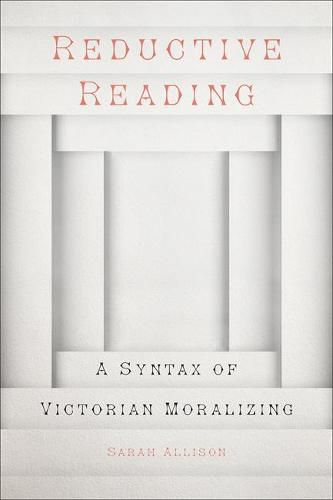Readings Newsletter
Become a Readings Member to make your shopping experience even easier.
Sign in or sign up for free!
You’re not far away from qualifying for FREE standard shipping within Australia
You’ve qualified for FREE standard shipping within Australia
The cart is loading…






How practices from the digital analysis of texts both simplify and enhance traditional literary criticism.
Honorable Mention, NAVSA Best Book of the Year by the North American Victorian Studies Association
What is to be gained by reading George Eliot’s Middlemarch from an Excel spreadsheet, or the novels of Charles Dickens through a few hundred dialogue tags-those he said/she saids that bring his characters to life? Sarah Danielle Allison’s Reductive Reading argues that the greatest gift the computational analysis of texts has given to traditional criticism is not computational at all. Rather, one of the most powerful ways to generate subtle reading is to be reductive; that is, to approach literary works with specific questions and a clear roadmap of how to look for the answers.
Allison examines how patterns that form little part of our conscious experience of reading nevertheless structure our experience of books. Exploring Victorian moralizing at the level of the grammatical clause, she also reveals how linguistic patterns comment on the story in the process of narrating it. Delving into The London Quarterly Review, as well as the work of Eliot, Dickens, Elizabeth Barrett Browning, Anthony Trollope, William Makepeace Thackeray, and other canonical Victorian writers, the book models how to study nebulous and complex stylistic effects.
A manifesto for and a model of how digital analysis can provide daringly simple approaches to complex literary problems, Reductive Reading introduces a counterintuitive computational perspective to debates about the value of fiction and the ethical representation of people in literature.
$9.00 standard shipping within Australia
FREE standard shipping within Australia for orders over $100.00
Express & International shipping calculated at checkout
How practices from the digital analysis of texts both simplify and enhance traditional literary criticism.
Honorable Mention, NAVSA Best Book of the Year by the North American Victorian Studies Association
What is to be gained by reading George Eliot’s Middlemarch from an Excel spreadsheet, or the novels of Charles Dickens through a few hundred dialogue tags-those he said/she saids that bring his characters to life? Sarah Danielle Allison’s Reductive Reading argues that the greatest gift the computational analysis of texts has given to traditional criticism is not computational at all. Rather, one of the most powerful ways to generate subtle reading is to be reductive; that is, to approach literary works with specific questions and a clear roadmap of how to look for the answers.
Allison examines how patterns that form little part of our conscious experience of reading nevertheless structure our experience of books. Exploring Victorian moralizing at the level of the grammatical clause, she also reveals how linguistic patterns comment on the story in the process of narrating it. Delving into The London Quarterly Review, as well as the work of Eliot, Dickens, Elizabeth Barrett Browning, Anthony Trollope, William Makepeace Thackeray, and other canonical Victorian writers, the book models how to study nebulous and complex stylistic effects.
A manifesto for and a model of how digital analysis can provide daringly simple approaches to complex literary problems, Reductive Reading introduces a counterintuitive computational perspective to debates about the value of fiction and the ethical representation of people in literature.